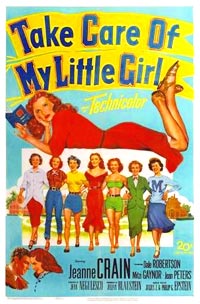Plot
Liz Erickson (Jeanne Crain) is a young, naive woman who has recently graduated from high school. Along with best friend Janet Shaw (Beverly Dennis), she leaves her parental home to attend Midwestern University, where her mother was once a legendary student.
Liz and Janet dream of being pledged by the elite group of girls who call themselves Tri-U Sorority. Liz thinks that joining a sorority is more important than her education, and is surprised that her roommate Adelaide Swanson (Mitzi Gaynor) is not interested in Tri-U.
During her first weeks of college, Liz has no trouble befriending Tri-U's members, including Dallas Prewitt (Jean Peters), Marge Colby (Betty Lynn), Merry Coombs (Helen Westcott) and Casey Krausse (Carol Brannon). Janet, on the other hand, does not make an impression on the snobbish girls. Neither does shy Ruth Gates (Lenka Peterson), whose mother was a respected Tri-U, but she (unlike Janet) is admitted to the pledge due to her family name. Liz is pledged as well. She feels guilty for seeing her dream come true, while Janet, crushed by the rejection, is leaving the college.
Liz also meets Joe Blake (Dale Robertson), a college senior and former soldier who is opposed to sororities due to their snobbish cliques. Liz is pushed by arrogant Dallas to date Chad Carnes (Jeffrey Hunter), the most popular fraternity boy, whose reputation is as a drunken womanizer. Chad wins her affection but convinces her to help him cheat at an important exam. Her sorority sisters acclaim her as a hero, but Joe disapproves of her lack of ethics.
"Hell Week" begins, which includes humiliating and playing pranks on the new pledges. On the insistence of Dallas, Ruth is released from the pledge, while Liz is assigned to go on silly errands. She runs into Joe, agreeing to accompany him to a party. Chad is tipped-off by a fraternity pledge that she went to the party, and he chastises Liz for ignoring her duties. Joe sticks up for her, and the two men get into a brief one-sided fist fight. Realizing that Joe is the one she wants to be with, she rejects Chad, removes her pledge pin and returns to Tri-U.
Liz is disgusted to find out that Ruth has been de-pledged. She finds Ruth wandering the streets. Liz takes her to a hospital, where she is diagnosed with pneumonia. Ashamed for being part of a clique that has done this, Liz heads back to Tri-U to return her pin. The girls feel that she must be out of her mind for doing this, but Liz castigates them for their hypocrisy and snobbishness. She leaves with Joe, wondering how her mother will react.
Production
In February 1950, it was announced that Anatole Litvak was set to direct and produce the film. [3] Even before, in January, a press report was released in which it was revealed that either Susan Hayward or Jeanne Crain was set for the leading role. [4] The role was eventually played by Crain.
Jean Negulesco later took over the direction. Darryl F. Zanuck was very enthusiastic about the film, and allowed for the budget to be increased so Negulesco could film additional scenes. [3] Jean Peters was cast in October 1950. [5] She was given the role by Negulesco after impressing him with her sewing. [6] The movie was an early role for Jeffrey Hunter. [7]
By late 1950, the film was the subject of much controversy. Along with another film critical of fraternities and sororities, For Men Only (1951), [8] many sororities in the country protested against the film and pressured the studio, 20th Century Fox, not to release it. [3] One reviewer noted that "even before the film was made, het-up sorority sisters blasted it like fruit growers protesting The Grapes of Wrath ." [3] Most of the complaints were later dropped due to the publicity they were generating for the film. [3]
This page is based on this
Wikipedia article Text is available under the
CC BY-SA 4.0 license; additional terms may apply.
Images, videos and audio are available under their respective licenses.
